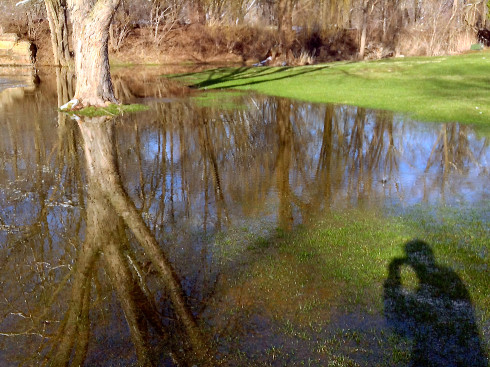I’ve been asking far too few questions lately.
Usually when I share something with you here, I want to give you something to be excited about, someplace you can dream to see someday.
But today, as I was triaging through old files, I came across a folder on my Mac called “Friend Docs,” resulting in a cascading series of events that led me straight down Memory Lane.
You see, ever since I got a new iPod, I’ve been shooting ABSURD amounts of HD video, and it’s filling up my drive faster that I anticipated. Turns out, a surprisingly large chunk of my space was also going to files that people have sent me over the past decade or so. Within the “Friend Docs” folder were photos of people I haven’t talked to in years. A Japanese musician, a German photographer, a graphic designer from New England. I suddenly wondered why I hadn’t spoken to them in so long and what their lives had become.
Now, don’t get me wrong. I know I’m not expected to stay in touch with all of them. Sometimes connections just fade naturally. Travel has taught me this. Life has taught me this. And I get it. I accept it. Usually, I even welcome it, because when we let go of a connection that doesn’t resonate with us, we make space for something even better to come through.
I am living proof of this.
But as I shuffled through old videos and photos (even pictures of post cards), I couldn’t help but get a bit melancholic. Once upon a time, these files had meant so much to me. And now I didn’t care at all about most of them. Only a few, the few that sparked a memory, held any remaining value for me.
And I couldn’t help but ask myself: What was the point of these friendships? We don’t stay in touch any more, so were they a waste of time? Was I pursuing a weak friendship connection in the first place with some of these people? Perhaps. Perhaps.
Heck, I used to have a pretty good Japanese vocabulary! (Reminded of this by a screenshot of me Skyping with an old Japanese friend.) When I try and read hiragana now, I almost feel embarrassed at how much I’ve forgotten. What was the point? What was the point of any of this if my memory for language is like a sieve?
 I let this thought stew for a while, and this afternoon I decided to go for a walk.
I let this thought stew for a while, and this afternoon I decided to go for a walk.
Outside, I discovered that a nearby stream had flooded, no doubt from all of the recent snowmelt. I’d been here dozens of times, maybe hundreds, and I’d never seen it like this — like a perfect mirror had been placed slightly above the landscape, and I stepped into the water with my waterproof shoes (just because I could).
Then I realized something.
In this changed environment, the stronger elements, often the older elements, reached out of the water easily. They would be fine.
I reflected: perhaps the passage of time is like a slowly rising flood. The memories are still there, submerged, but they aren’t always available for me to consciously access. And each of those memories has roots that go deep, even if I can’t see them. They reinforce other memories. (It’s all one big neurological network, right?)
It’s funny, because I’ve had this attitude toward relationships for a while now, that if something ends, that doesn’t mean it’s a failure. As long as I learned something, as long as I grew, it’s not a loss. But I guess I wasn’t applying this same belief to friendships. Or at least, not all of them.
But it remains true.
As I stood out and reflected upon my own reflection in the water, I realized: even if I learned another language fluently from a friend and then forgot it because the friendship faded, there would be growth in that, even if I couldn’t put my finger on exactly what I’d learned about life. Even if I completely forgot the language afterward, it would still be worth it.
And then I expanded upon it. I realized that everyone I’ve ever met, no matter how briefly I’ve known them, has added to my learning in some way. Either they’ve provided more data for me to realize something new about humanity has a whole, or just provided a minor perspective shift, the learning is there, no matter how small.
In the end, not everything has to be remembered. And not everything has to be practical. It just has to be experienced honestly.
That’s something I expect I’ll have to keep telling myself.
What about you? From traveller to traveller:
How do you react when you reflect on friendships long faded?

